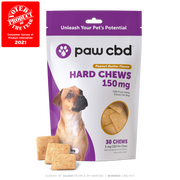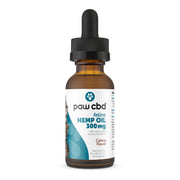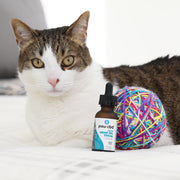Pet CBD can help support your dog or cat’s digestive health in a number of ways, mostly by helping them stay calm and relaxed. There are clear connections between your pet’s mental state and stress levels and their digestive health. Animals who use CBD pet products are more likely to be collected and confident, and experience solid general wellness that impacts all realms of their life – including their digestion.
How CBD Works in Your Pet’s Digestive System
CBD oil for pets delivers cannabinoids into your pet’s body, where they are processed by your cat or dog’s endocannabinoid system. This complex system is shared by many mammals, including humans, and it consists of three parts: enzymes, cannabinoids, and cannabinoid receptors.
There are cannabinoid receptors in your pet’s bowels, so digestive health is one of the bodily processes that is directly impacted by pet CBD. When you give your pet CBD, the receptors in their bowels are activated, which reduces irritation in their digestive tract.
CBD Promotes a Sense of Calm, Which Improves Digestive Health
It’s not uncommon to hear the gut referred to as “the second brain,” and that applies for pets as well as people. The mental and emotional state of your pet will impact their digestive health, including their bowel movements, their appetite, the digestive process itself (how food moves through their body and how nutrients are absorbed), and the comfort of their gut and stomach (i.e., whether they experience cramping or constipation).
All these facets of digestive health will be directly impacted by your dog or cat’s stress and anxiety levels. It’s not uncommon for pet parents to note digestive changes or disrupted bathroom habits as the first sign that their pet is experiencing stress or anxiety – especially in cats, who are masters of disguise and might not let on to their anxiety levels in any other way.

Increased Relaxation from Pet CBD Means a Better Appetite
Sometimes, a pet's digestive issues are caused by an appetite problem – either they aren’t eating enough food during meal times because their appetite is low, or perhaps they eat their food too quickly because they have such a voracious appetite. Appetite issues can be the root of many digestive problems for pets, both cats and dogs. Luckily, CBD for pets can improve your pet’s appetite by providing them with a general sense of well-being and calm. When your pet is relaxed and happy, they are more likely to approach meal times with less frantic behavior or avoidance.
CBD Can Improve Bowel Movements by Reducing Anxiety
Anxiety and stress in your pet can increase the speed of your pet’s bowel movements, which means their food moves from entrance to exit too quickly. This causes diarrhea because your pet’s body doesn’t have time to absorb as much fluid from the food while it’s digesting.
When your dog or cat is more calm and relaxed, bowel motility is reduced and the food moves through the digestive tract at a pace that allows your pet’s body to absorb all the nutrients and fluid it needs from food. This, in turn, results in more normal bowel movements – which is especially important when you’re the one carrying the doggy bags or scooping the litter box!
How Paw CBD Pet Products Can Support Digestive Health
Paw CBD’s pet products are uniquely suited to support your pet’s overall health, and that includes their digestion. Our pet CBD is designed specifically for your pet’s body, which is why we have CBD oil for dogs and CBD oil for cats rather than generalized products. Feline and canine bodies and digestive systems are different, so we design each of our products to be specifically suited to your animal’s species.
The best CBD oil for cats and dogs is made from domestically grown USA hemp and features a Superior Broad Spectrum formula that utilizes the most effect parts of the hemp plant – not only CBD, but other supportive cannabinoids like CBN and CBG, as well as terpenes that can positively impact your cat or dog’s digestive health.

Furthermore, if you are looking to use pet CBD oil specifically to support your pet’s digestive health, our CBD pet products are available in delicious flavors made with pet-safe ingredients. The last thing you want is for your pet’s new CBD dog treat or cat treat to cause additional digestive upset because of some strange or irritating ingredient that your pet finds unappealing. Flavor matters, and our CBD oil for dogs and cats is always tasty and delightful for your animal.
With a Certificate of Analysis provided for every batch, you can rest assured that Paw CBD pet products won’t disrupt your pet’s digestion or cause allergic reactions because our ingredient lists and concentrations are accurate every time.
Pet CBD Oil Dosage for Digestive Health Benefits
Providing your pet with the correct dosage of pet CBD oil is crucial because giving your dog or cat too much CBD can actually cause digestive upset. If you give your pet a CBD product that is too strong or concentrated for their size, they might actually experience nausea or cramping instead of digestive relief and comfort.
Choosing the right amount of CBD for your dog or cat is not an exact science, because your pet is a unique creature with unique needs. The best starting point is your animal’s weight: use the smallest recommended amount of pet CBD oil for your pet’s weight range. Use this amount for 30 days before changing the routine – you should notice the benefits start to appear as the CBD builds up in your pet’s body over time. If you notice negative side effects like lethargy or digestive irregularities, stop your routine and consult your veterinarian.
CBD oil for dogs and cats is not a treatment for digestive problems and should not be used as such. Pet CBD oil can improve your dog or cat’s overall health and demeanor, which gives them the best chance of managing digestive issues on their own. But if they have a medical condition related to their digestive system, that will need to be treated independently with the help of your veterinarian.




